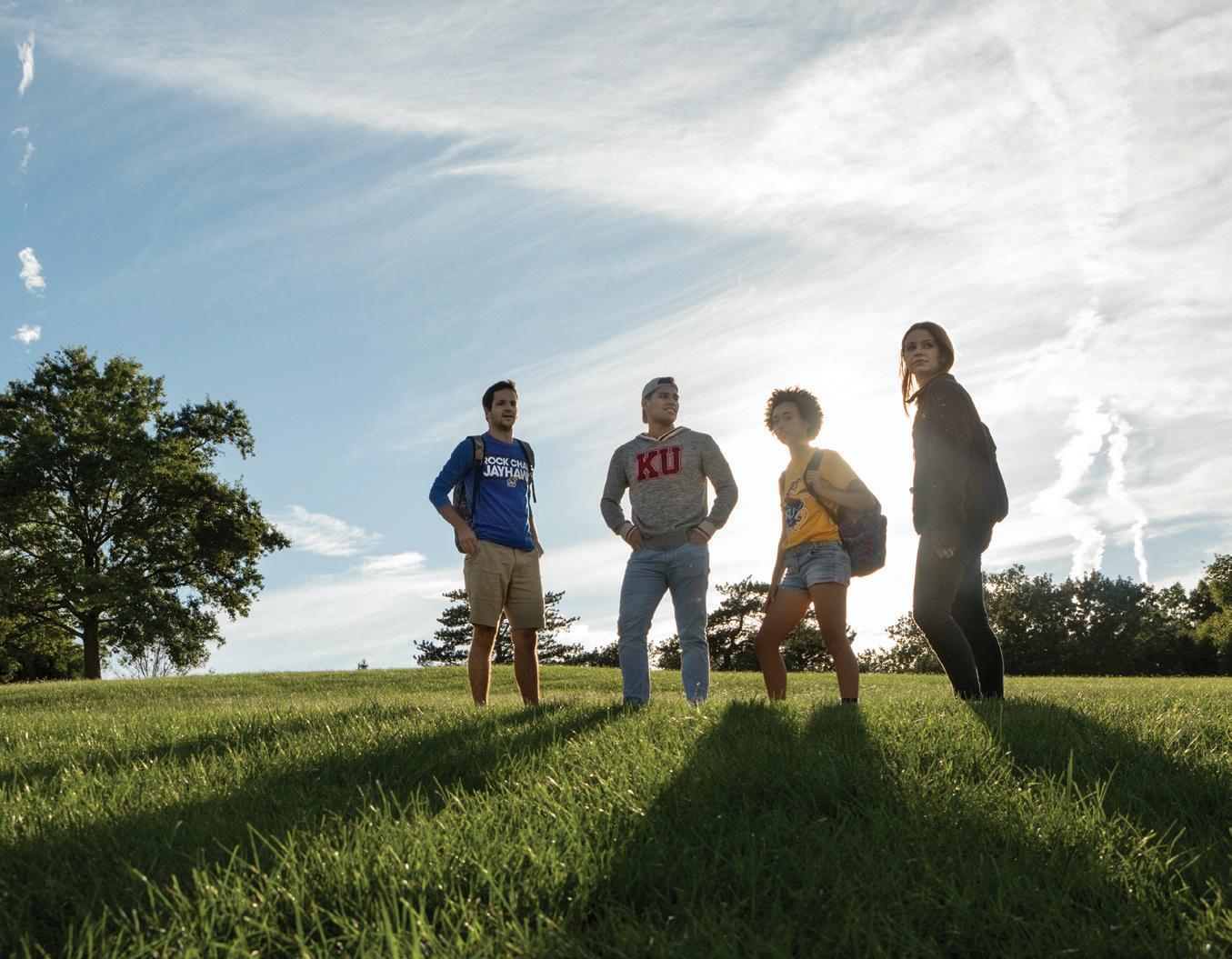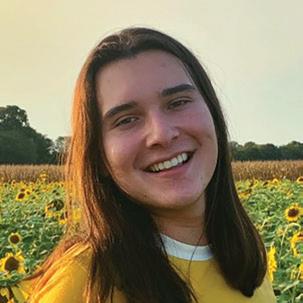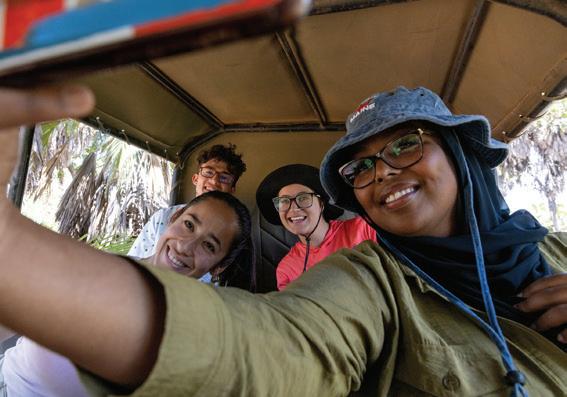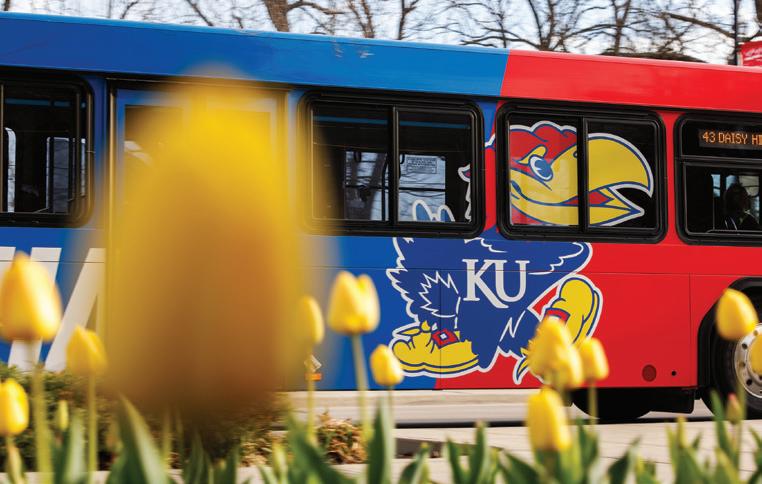
WHAT WILL YOUR JAYHAWK STORY BE?

ACADEMIC YEAR 2024–2025
PREPARING EDUCATORS AND HUMAN SCIENCE PROFESSIONALS AS LEADERS SINCE 1909



ACADEMIC YEAR 2024–2025
PREPARING EDUCATORS AND HUMAN SCIENCE PROFESSIONALS AS LEADERS SINCE 1909
In the School of Education & Human Sciences, students like you make history. Make memories. Make discoveries. They make news and become educators or human science and sport professionals prepared as leaders to face and shape the world. Every KU student becomes a part of the Jayhawk family.
What will your story be?




The School of Education & Human Sciences at the University of Kansas ranks 11th among all U.S. public schools of education and human sciences 2024-2025 U.S. News & World Report
$1M+ $75M 1
scholarships awarded research expenditures KU is the only Association of American Universities each year each year (AAU)-designated research institution in the state of Kansas


Of all undergraduate students within the KU School of Education & Human Sciences,
61%
21%
15%
55% are women are from historically are first-generation are Kansas residents underrepresented identities


Founded in 1909, the University of Kansas School of Education & Human Sciences educates future teachers, administrators, counselors, psychologists, and health and sport professionals. We serve Kansas, the nation and the world by preparing leaders and practitioners in education and related human science fields. Students expand and deepen their understanding of education as a fundamental human endeavor, gaining the necessary skills and experience to help society define and respond to its educational responsibilities and challenges.
We offer a variety of undergraduate programs from our Lawrence Campus sites at Joseph R. Pearson Hall and Robinson Center. The School of Education & Human Sciences also offers several degree programs at the KU Edwards Campus in Overland Park, Kansas.
Creating a welcoming environment for all We believe that creating a welcoming environment for all is vital to our success — specifically, our teaching, advising, mentoring, research and service functions. As members of the university and the larger community, we value intellectual variety and knowledge, which requires a respectful and caring culture.
Undergraduate degrees offered
• Bachelor ’s degree programs in curriculum & teaching
• Bachelor ’s degree programs in health, sport & exercise sciences

Explore our undergraduate degree programs: soehs.ku.edu/academics/undergraduate
Most teacher education classes are in Joseph R. Pearson Hall, a former residence hall
Teacher education programs at the University of Kansas lay the groundwork for successful careers in educational settings.
Students can study abroad, take advantage of learning from prestigious faculty, and gain diverse experiences through their fieldwork in Lawrence and surrounding school districts. The four-year initial licensure programs cover a wide variety of age ranges and subject areas. Once they graduate from one of these teacher education programs, Jayhawks are prepared to pursue a teaching license in Kansas with support available for obtaining licensure in other states.
Elementary education and our two blended general education/special education programs (unified early childhood and elementary education unified) are each set up in a cadre model, which means that students complete a majority of their teacher preparation courses with a small group of 25 to 30 others.
Students in secondary teacher education gain expertise in their chosen teaching interests by focusing a large percentage of time in that specific content area, while elementary teacher education students cover a wide breadth of subjects.
“The School of Education & Human Sciences has provided me with a safe community of friends who support me through my journey to becoming a teacher. I couldn't have accomplished my goals without the support of the amazing professors and friends I have met along the way. My favorite memories here have been creating long-lasting connections and learning from some of the most kind-hearted people I have ever met. Being in college is difficult but having a group of people who make you feel safe and supported makes a world of a difference.”

Carly Hayden, elementary education

“The professors in the Unified Early Childhood (UEC) program are so passionate about what they do and are always excited to share their experiences. They prove they care about us by being great advocates and listening to our point of view. The UEC student cohort are some of the most inspiring people I have ever met. I loved having them in all of my classes and having opportunities to collaborate and hear their different perspectives.”
Madigan Sanders, unified early childhood, ’24
A bachelor’s degree in unified early childhood teacher education prepares you for work in inclusive settings to meet the learning needs of young children, ages birth through 3rd grade, including those at risk for and with developmental delays or disabilities. Students who complete this program are prepared to apply for a teaching license in general education and special education.

A bachelor’s degree in elementary teacher education prepares you to teach children in pre-K through 6th grade. This program combines general education courses and professional education coursework with multiple field experiences at the elementary level in diverse communities.
A bachelor’s degree in elementary education unified prepares you for work in inclusive settings to meet the learning needs of all children in kindergarten through 6th grade, including those with disabilities. Students who complete this program are prepared to apply for a teaching license in general education and special education.
2 semesters of practicum and student teaching offer valuable classroom experience
97% of Jayhawks who graduate from the School of Education & Human Sciences pass their licensure exam (academic year 2023-2024)
$58,000 average yearly teaching salary in the state of Kansas 2023-2024 Kansas Department of Education
4 years to complete the teacher education program at KU when starting the program in your first college semester
<50 miles to a valuable student teaching experience, all within a 50-mile radius of Lawrence
The bachelor’s degree in secondary history & government teacher education prepares individuals to teach in both middle school and high school classrooms. History & government is also commonly known as social studies. The teacher education program combines history, political science and geography courses, as well as professional education coursework, with multiple field experiences in diverse communities.

“The
The bachelor’s degree in secondary English teacher education prepares pre-service educators to teach adolescents in both middle school and high school classrooms. The program combines literature-based theory and knowledge with culturally diverse readings and discussions. In addition to the course offerings in the School of Education & Human Sciences, courses taught by faculty from the Department of English offer students learning options in rhetoric, linguistics and literature.
Careers in science, technology, engineering and mathematics (STEM) all require creative thinking and leadership. STEMTeach KU is designed to fit the unique needs of STEM majors in a way that develops their ability to be leaders in their field and in the classroom. In this program, students can pursue a teaching license alongside earning a degree in one of several STEM fields. This program is offered in collaboration with the College of Liberal Arts & Sciences.
STEMTeach program at KU gives me the opportunity to combine my love of science with my desire to guide kids throughout their educational journey. It has broadened my horizons on how young people learn today, as well as their enthusiasm for science and math. The program has allowed me to explore different career paths and has given me many mentors and friends along the way.”
Michael Abeita, STEMTeach KU
Field experience
KU students leave our initial teacher licensure programs with a clear understanding of the expectations of the teaching profession and with approximately 600-1,000 hours of field experience.
Licensure endorsements
The Department of Curriculum & Teaching also offers licensure endorsements in Special Education (provisional) and Teaching English to Speakers of Other Languages (TESOL).
Student teaching
Student teaching is a requirement for all of our initial teacher licensure programs. Students have the opportunity to teach in a variety of settings — urban, suburban, or rural areas. Student teaching is completed within a 50-mile radius of the main campus in Lawrence, Kansas. Many of our teacher education programs include two semesters of practicum and student teaching, as well as multiple semesters of experience in education settings. STEMTeach KU, PE+, visual art education, and music education include just one semester of student teaching. Students interested in visual art education or music education should contact the College of Liberal Arts & Sciences or the School of Music for more information.

Learn more about student teaching and other field experience opportunities at KU: soehs.ku.edu/student-life/field-experience
James Naismith, creator of basketball, was a physical education instructor at KU

The academic programs offered through the Department of Health, Sport & Exercise Sciences (HSES) lay the groundwork for success in a variety of health, science and sport careers.
HSES students have access to study abroad programs, research with faculty, and volunteer opportunities in the immediate community and beyond. In addition to its academic programs, the department offers research opportunities for faculty and students in a variety of laboratories and clinics.

“Being a part of KU sport management is an experience like no other. Not only have I learned about the inner workings of the sporting industry from experts in the field, but I have had the chance to gain real-world professional experience through the many opportunities the program has provided.”
Taylor Durst, sport management
The bachelor’s degree in sport management prepares students for a variety of sport-entertainment, business, education, coaching and performance positions in the sport and athletics industry: professional athletics, intercollegiate athletics, international sports, Olympic sports, athletic footwear and apparel, youth and high school athletics, as well as other sport, recreation and health-related organizations. Students learn from full-time faculty who are prominent scholars and expert practitioners. Students also get to interact with program alumni and other sport professionals working for local sport organizations such as the Kansas City Chiefs, Sporting Kansas City, Kansas City Current, Kansas City Royals, Garmin, Kansas City Sports Commission and Kansas Athletics, as well as other leading national and global sports organizations and brands.
Hands-on learning and final internship
Volunteer and work experiences in the sports industry are continuously offered throughout a sport management student’s time in the program. A semester-long sports internship is required for sport management majors during the last semester of their program, providing real-world experience and the opportunity for seniors to grow their network of future employer contacts. All classes in the program must be completed before the final full-time sports internship.
Career directions
Student-athlete development & leadership professional
Marketing & fan experience director
Public relations & communications director
Brand development & product designer
Social media & creative content management manager
Business development manager
Name, image & likeness strategy director
Community relations coordinator
Facilities & events operations coordinator
Youth sports coordinator

“PE+ is not just a program on campus, but a community. It’s a tight-knit group from the professors to the students. Everyone is committed to learning how we can best serve communities through physical activity and FUN!”
Blaine Jepson, physical education plus
The bachelor’s degree in physical education plus (PE+) prepares individuals to become PE teachers at the PK-12 levels. Students who graduate with a bachelor’s degree in PE+ will have fulfilled the requirements for the degree as well as the requirements to pursue an initial teaching license in physical education for pre-kindergarten through 12th grade in Kansas. The PE+ program also prepares graduates to pursue a licensure endorsement (by KSDE examination) in a variety of areas, or earn a minor in business or sport management.
Student teaching
Student teaching is required for PE+ majors. Student teaching sites are close by, within a 50-mile radius of Lawrence.
Career directions
Teacher
Fitness professional
Program coordinator
Curriculum specialist
Department chair
Physical activity leader
Athletic director

The bachelor’s degree in community health prepares students for career paths in a variety of public health, community-based and clinical settings. The program is rigorous and dynamic and allows students who are passionate about health issues in a community setting to work with individuals to develop healthy attitudes and behaviors. Students in this program acquire the knowledge and skills to engage with diverse communities in the development, implementation, and assessment of health promotion programs. Ultimately, it is through this program that students get to tailor their unique experience to achieve their professional goals, as well as ignite social movement, make connections and work toward achieving positive health outcomes for our local communities.
specialist exam
Coursework in our undergraduate program also prepares students for the Certified Health Education Specialist exam, a nationally recognized competency-based certification. Our program provides study materials to best situate students for success as they pursue this professional certification, making them more competitive candidates for future educational programs and/or job opportunities.
A semester-long internship, 560 hours or more, is required for community health majors during the last semester of their program. The senior internship provides real-world experience and future employer contacts. All classes in the program must be completed before the internship.
Career directions
Hospital/clinic-based educator
Health consultant
Health education specialist
Health program coordinator
Corporate wellness professional
Research coordinator
Community outreach specialist
Community health worker
“I like getting to explain what ‘community health’ really means and share the great experiences I have had so far learning about health-based sciences, connecting with amazing staff and faculty, and building relationships with peers.”
Alden Pennington, community health
The bachelor of science in exercise science and bachelor of applied science in exercise science degrees provide a thorough understanding of the human body and will prepare you to work in health, medical or fitness-related professional fields. The programis a designated Education Recognition Program throughthe National Strength and Conditioning Association. Program coursework focuses on various studies — physiology of exercise, motor control, biomechanics, and rehabilitative exercise.
Preparation for professional programs
Coursework in our bachelor of science program prepares students to meet prerequisite requirements for many professional school programs including the physical therapy program at the University of Kansas Medical Center. Those who choose to pursue an advanced degree after graduation are considered for many highly selective master’s and doctoral degree programs across the U.S.
Exercise science students choose either to complete an approved internship experience or pursue a program track full of approved elective courses. The semester-long internship, 600 hours or more, provides students with hands-on experience and is completed during the last semester of the program, once all classes in the program have been completed.
Career directions
Exercise/fitness instructor
Personal trainer
Clinical exercise physiologist
Injury prevention specialist
Sport medicine specialist
Strength and conditioning coach
Sport scientist


65 internship sites
36% of Jayhawks who graduate with a major in community health pursue graduate degrees
56% of Jayhawks who graduate with a major in exercise science pursue graduate degrees
6 national championships won by the KU men’s basketball team (four NCAA Division 1 championships, two Helms championships prior to the formation of NCAA)
“I was provided countless opportunities to get involved as an exercise science major. Throughout my time as an undergraduate student, I took advantage of expanding my knowledge outside of the classroom through involvement in research. Moreover, I have developed relationships with the faculty and maintained friendships with my peers throughout multiple courses over the years. I am forever grateful for my time as an HSES student!”
Kacee Coast, exercise science, ’24, now pursuing a master’s degree in exercise science at KU

Jayhawks may enhance or further specialize their major course of study with an undergraduate minor or certificate.
Education studies minor
The minor in education studies provides a solid grasp of essential theory and research in education, along with an opportunity to focus on particular aspects of the process of the educational system. With choices from lower and upper division elective courses, the minor also provides undergraduate students of any major an opportunity to develop understanding of the legal, social, political and economic forces that influence and shape educational policies.
Athletics coaching minor
Designed for students interested in coaching as a career or a hobby, the minor in athletics coaching offers a core set of skills — including coaching team sports, individual and dual sports, methods of strength training and conditioning, and sport facilities and event management. Students may choose from a wide variety of electives.
Sport & exercise psychology minor
This minor provides strong training for students moving directly into employment in sport, exercise and wellness settings after graduation, as well as a solid foundation for those pursuing graduate study in sport and exercise psychology. Students will acquire content knowledge and the skills to apply theory to practice in sport and exercise settings. They will learn to create optimal environments and deliver mental skills training to individuals of all ages and levels.
Sport management minor
This minor provides students with a skill set in sport management, including literacy in sport marketing, sport finance, personnel management, and the sociological aspects of sport. Students will also have a wide variety of electives from which to choose, including sport facilities, sport in film, sport communication, and experiential learning in sport.
Name, image & likeness (NIL) certificate
This undergraduate certificate imparts core skills in the name, image & likeness (NIL) field, easily the fastest-growing area for new positions in college athletics. This certificate is designed to serve students interested in working in the NIL space, as well as studentathletes at the University of Kansas who are looking for training about how to manage their own name, image and likeness.

The KU School of Education & Human Sciences offers students, faculty and instructors access to a variety of campus-based labs, resources and technology services. As a student, you’ll have the opportunity to conduct research directly under the supervision of faculty members who are renowned scholars and established leaders in their fields of study. Here are just a few examples.
Embracing transnational students as English teachers
Transnational Language Teacher Identities in TESOL: Identity Construction Among Female International Students in the U.S., a book co-written by Hyesun Cho, professor of curriculum & teaching, follows the stories of 13 women studying to be teachers of English to speakers of other languages at universities across the United States and suggests how their stories can improve education for others.
Teaching lifelong physical activity
Everyone who has gone through high school probably remembers gym class, for better or worse, and the influence their teachers had on the class environment. A recent study led by Ken Murfay, assistant teaching professor of health, sport & exercise sciences, shows that physical education teachers greatly influence students’ perception of the class and its purpose and also influence how likely they are to remain physically active later in life.
How to teach the teachers
How do you teach someone to be a teacher? And what does it mean to be a professional educator? Those questions are at the heart of Principles That Shape English Teacher Education: Pedagogy for Innovation and Change, a new book co-edited by Heidi Hallman, professor and chair of KU’s Department of Curriculum & Teaching. The book examines the methods course, a class every aspiring teacher takes to learn the practice of being an educator.
Effects of overtraining on muscle
A study by researchers in KU’s Jayhawk Athletic Performance Laboratory explores the role of hyaluronic acid in muscles and what happens when fit people overtrain. “We want to understand what happens when you push things, because that’s what athletes do, they push themselves to the limit,” said Andy Fry, professor of health, sport & exercise sciences, lab director and study co-author.


For more information about labs and research within the School, visit hses.ku.edu/ mission-vision/ research-labs
The KU Office of Study Abroad & Global Engagement (SAGE) offers programs for students in every part of the world and in a wide variety of majors. SAGE works closely with KU’s academic departments to identify and evaluate study abroad options and courses so you will know how a recommended program fits with the degree requirements of your major.

Curious about your study or teach abroad options? Learn more at studyabroad.ku.edu/major

First-year undergraduate students may be directly admitted to their SOEHS major if they meet these assured admission standards:
• 3.25 GPA on a 4.0 scale, no test scores required or
• ACT score of at least 21 or SAT score of at least 1060, plus a GPA of at least 2.0
Current KU and transfer students may be admitted to their SOEHS major if they have a 2.75 KU plus transfer cumulative GPA

Read about admission requirements at soehs.ku.edu/admission

Since 1958, the School of Education and Human Sciences has offered financial support through academic scholarships to thousands of its students. School of Education & Human Sciences scholarships are awarded on a competitive basis, taking into account both need and merit. Priority for undergraduate scholarships will be given to seniors.

For more about scholarships, visit soehs.ku.edu/admission/scholarships

Have questions? Ask us at soehs.ku.edu/current-students/ undergraduate-student-ambassadors

To schedule your visit, see admissions.ku.edu/visit


